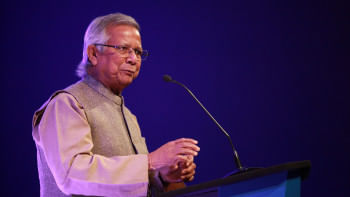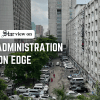Nation expects a lot from the interim government

We extend our heartiest welcome to the interim government that begins its journey during an extraordinary time in our history. The swearing-in of advisers last night comes nearly four days after a student-led mass uprising overthrew the iron-fisted government of Sheikh Hasina, creating a power vacuum that led to a massive disruption in law and order, civil service, and not to mention, public life. We expect things to get back to normal now that the interim government has finally taken over the reins, and chief adviser Nobel laureate Dr Mohammad Yunus' first message after landing in Bangladesh on Thursday afternoon was one of hope, reconciliation, and peace—exactly what citizens need at this moment.
Given the unprecedented violence that occurred both before and following Hasina's fall on Monday, the first order of business for the government would be to de-escalate any potential for further violence. Dr Yunus, too, has stressed that restoring law and order will be his first priority. For that, it is crucial to ensure the 2-lakh-strong police force are back on active duty, resolve the complications facing them, and operationalise all police stations destroyed or damaged in post-uprising attacks. Overhauling and depoliticising the force should also be on the agenda. Moving ahead, we would like to see police in control of regular law enforcement activities, without needing to depend on the army or other security forces.
The last four weeks of deadly clashes and vandalism have also caused massive economic losses, disruptions, and reputational damage for Bangladesh. The economy was already in a tough spot prior to this, so putting it back on a path of recovery will be a top priority. Three crucial sectors disrupted by the recent events are import-export, e-commerce and garment industry, which must be resumed in full swing. The government should also focus on containing the inflation, stabilising exchange rates, and bringing down prices of food. As things stand, our economy is disastrously unbalanced, with persistent inequalities and a stagnant private job sector. These too must be addressed.
The education sector is another victim of the recent unrest. What the students have done in recent weeks will be remembered for generations, but as future nation builders, we need them back in classrooms. We urge the new administration to ensure that all schools, colleges and universities are reopened immediately. But it is vital that the crippling influence of party-based student politics is not tolerated again, especially in public university campuses and dormitories. The government should also focus on ensuring good governance. That means unravelling the politicisation of key institutions like the civil service, judiciary, and election mechanism, and establishing a culture of professionalism and accountability. On the diplomatic front, the government should signal to all our partners that all bilateral and multilateral relations will be normalised without delay.
Finally, we should start the process of establishing justice for the over 500 people who died in recent weeks. We need closure but also reconciliation so we can move ahead as a nation. It is time for thorough and impartial investigations, preferably through an international independent commission headed by the UN, into each of the killings. In the end, however, it should lead to us mending the flaws in our political system which caused the tragedy in the first place. Otherwise, the huge sacrifices that went into making this uprising successful will have been for nothing.


 For all latest news, follow The Daily Star's Google News channel.
For all latest news, follow The Daily Star's Google News channel. 











Comments